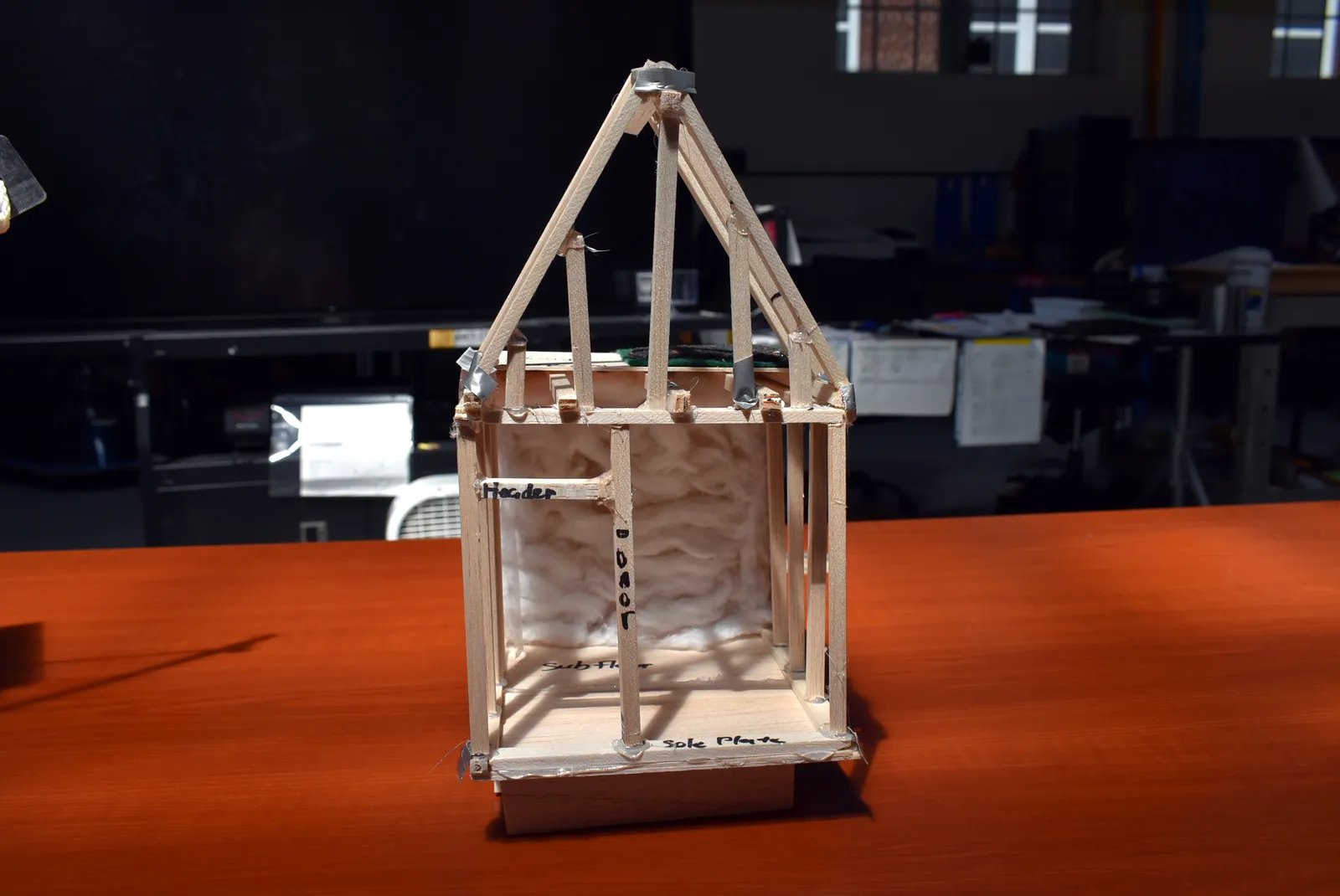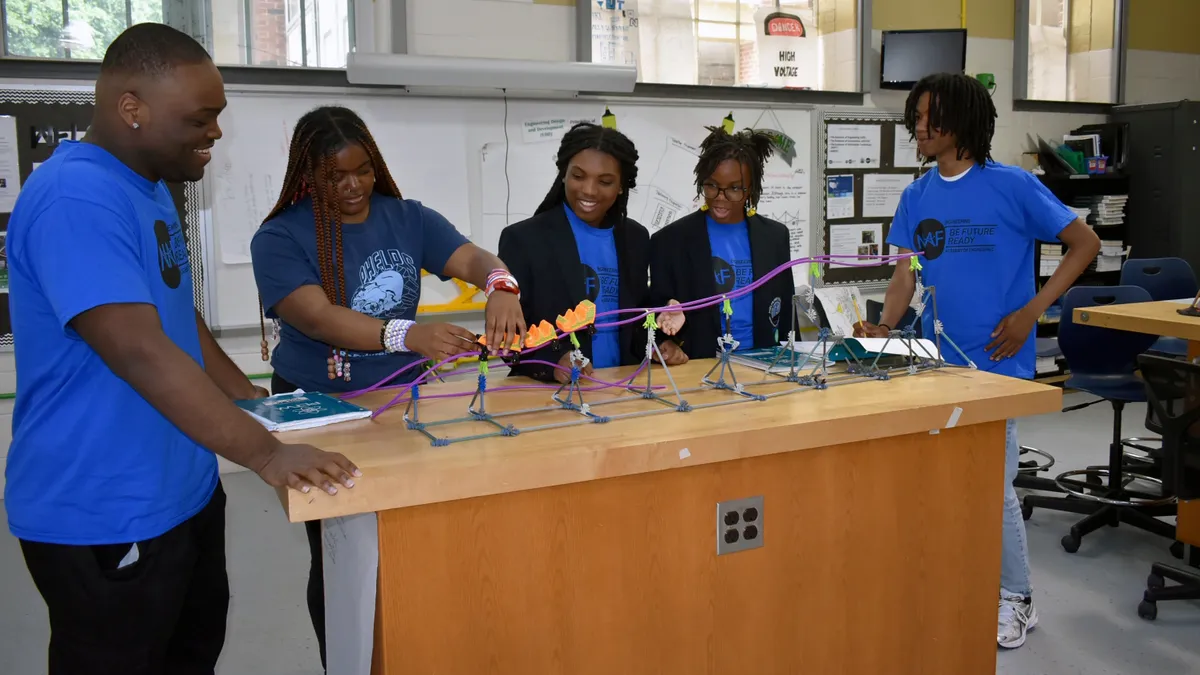WASHINGTON — In a large window-filled engineering classroom with high-tech equipment, King Muhammad, a rising 12th grader at Phelps Architecture, Construction and Engineering High School, jots over to a desk and picks up a mini home construction model. The foot-high stick structure seems simple, but then Muhammad points out the subfloor, the insulation, the arches and sheathing.
The model, which Muhammad created alongside classmate Lania Lake, who is also a rising 12th grader, is one of many memorable projects he's completed as a student at the 320-student District of Columbia public school. For the past three years, he's learned STEM skills and how that knowledge relates to careers in civil and mechanical engineering, as well as other professions.
What's been more rewarding, he and a handful of other rising seniors said, is how their lessons and projects have expanded their awareness of how their modern career and technical education studies relate to family members' well-honed and more traditional professions.
For instance, Muhammad's late grandfather was a jeweler, which inspired him to study blacksmithing, or the skill of shaping metal into objects like tools.

"I have the interest in blacksmithing, but engineering has things in the curriculum that you can take and put on blacksmithing, like structural analysis [and] project management," Muhammad said. He explained that for a lesson on bridges, he learned that the metal used can help the structure's durability.
Lake's grandfather owned a construction company, which has influenced her passion for designing buildings and doing hands-on projects. De'Arra Parkinson's grandfather also owned a construction company, fueling her curiosity of careers in architecture and engineering. Ne'vaeh Akoto's uncle worked on HVAC systems, and Akoto enjoyed a class he took at Phelps where he learned about heating and cooling systems.
As the students prepare for their last year of high school and pick senior capstone projects, they say they are inspired by their personal connections to traditional careers and the ways those careers are being modernized by technology.
"It helped deepen my passion for overall what I want to do in the future," Muhammad said.
Students finding their career interests
Olatundun Teyibo, director of the NAF engineering and IT academies at Phelps, said the CTE program helps to expose students to various career paths, including learning about different jobs that they are and are not interested in — either through their studies, hands-on applications of what they've learned, or from professionals in that field.
NAF is a national education nonprofit that brings schools and businesses together to help students prepare for careers, college and the future.
Connections with local employers is a "win-win" for students and for employers, because students can learn about job experiences, and employers can learn from students about their interests and challenges, Teyibo said.
"Many times, the students can either see themselves in those fields, do more research about it, or go into a different pathway," she said. "CTE programs, I think, allow students to know what they want, so when they get to college, they don't keep on changing fields and incurring more debt."
She later added in an email that the federal government should ensure that CTE programs continue to be adequately funded to provide access to all students, especially those in underserved communities. She also suggests overall college debt would be lower if students were exposed to high-quality CTE programs in middle and high schools.
As an administrator, Teyibo says she's inspired by the students' persistence, academic growth, risk-taking and adaptability. "What energizes me is they're passionate about learning."
Making hard work pay off
While the students say they have enjoyed their studies and have a growing appreciation of the connections between professions in their families and modern careers, the work has been difficult at times.
"You miss one thing, and you could fall way behind," said student Bryce Simmons.
Student De'Arra Parkinson said that while the engineering studies are challenging, they've actually helped with preparing for physics classes and honing comprehension skills.
For the next school year, the students are preparing for their capstone projects, which are lengthy in-depth studies about their passions. Among the topics being considered are aerospace, cooking, music and blacksmithing.
"I come to work every day because they're very detailed, they're very focused, and it's never a boring day."

Teresa Broadnax
Pre-engineering teacher at Phelps ACE High School
The students credit the school's pre-engineering teacher Teresa Broadnax for creating study packets and fun review games, as well as providing snacks and study support.
"She'll repeat a lesson, too, if the students really don't know," said Simmons. "She really makes sure you got everything you need."
Broadnax, who has taught at Phelps for 10 years, deflects the attention back to the students. She said the students are "the reason why I come to work every day, because they're very detailed, they're very focused, and it's never a boring day, and they know what they want to do. I'm just happy to be able to be a part of that.”










